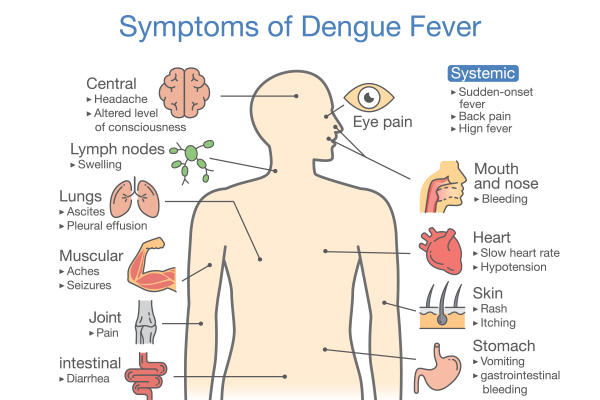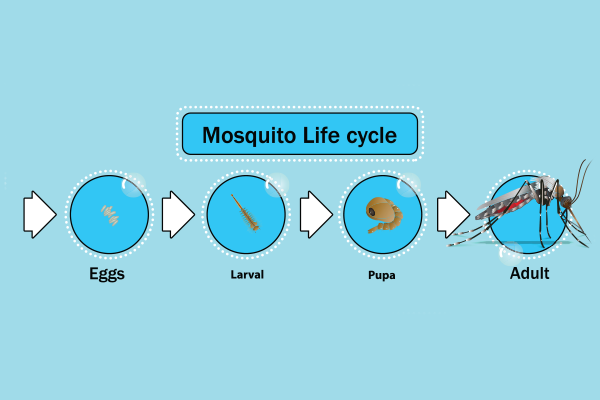
Listen to article
Loading audio...
Dengue fever poses a major public health threat, particularly in tropical and subtropical areas. As a mosquito-borne disease, it poses a serious threat to millions of people worldwide. In India, the incidence of dengue fever spikes during the monsoon season, making awareness and prevention crucial. This blog aims to provide comprehensive information on dengue fever, its prevention, and health tips for November, a critical month for dengue awareness in India.
Synopsis
Understanding Dengue Fever
Dengue fever is caused by the dengue virus and is transmitted to humans through the bites of infected Aedes mosquitoes, especially Aedes aegypti. These mosquitoes are particularly active in the early morning and late afternoon. Dengue fever can range from mild to severe, with symptoms appearing 4-10 days after the mosquito bite.
Symptoms of Dengue Fever

The symptoms of dengue fever can vary but commonly include:
-
High fever
-
Severe headache
-
Pain behind the eyes
-
Joint and muscle pain
-
Mild bleeding (such as nose or gum bleeding, or easy bruising)
In severe cases, dengue can escalate to dengue hemorrhagic fever or dengue shock syndrome, both of which can be life-threatening. Symptoms of severe dengue include intense abdominal pain, persistent vomiting, rapid breathing, bleeding gums, fatigue, restlessness, and blood in vomit.
Consult our internal medicine specialists in Ghaziabad if you are experiencing dengue symptoms.
Dengue Prevention
Preventing dengue fever requires reducing mosquito populations and minimizing exposure to mosquito bites. Here are some effective strategies for dengue prevention:
-
Remove Breeding Sites: Aedes mosquitoes thrive in stagnant water. To prevent their breeding, regularly empty, clean, or cover containers that can hold water, such as buckets, flower pots, and discarded tyres. Make sure water storage containers are properly covered.
-
Use mosquito repellents: Apply repellents on exposed skin and clothing. For effective protection, choose products containing DEET, picaridin, or oil of lemon eucalyptus.
-
Wear Protective Clothing: Wear long-sleeved shirts, long pants, socks, and shoes to reduce skin exposure to mosquito bites, especially during peak mosquito activity times.
-
Install Screens and Nets: Fit window and door screens to prevent mosquitoes from entering your home. Sleeping under mosquito nets, especially for infants and young children, provides additional protection
-
Use Mosquito Traps and Insecticides: Employ mosquito traps and use insecticides to reduce mosquito populations. Follow the manufacturer's instructions for safe and effective use.
-
Community Efforts: Participate in community clean-up campaigns to eliminate mosquito breeding sites. Public health authorities often conduct fogging operations to kill adult mosquitoes.
Health Tips for Dengue Prevention

November is a critical month for dengue awareness in India due to the post-monsoon period, which creates ideal conditions for mosquito breeding. Here are some health tips to follow in November to prevent dengue fever:
-
Stay Informed: Keep yourself updated on dengue outbreaks in your area. Follow local health advisories and take necessary precautions.
-
Maintain Cleanliness: Ensure that your surroundings are clean and free of stagnant water. Regularly check and clean water storage containers, flower pots, and other potential breeding sites.
-
Promote Awareness: Educate your family, friends, and community about dengue prevention. Share information on social media and participate in awareness campaigns.
-
Seek Medical Attention: If you or someone you know exhibits symptoms of dengue fever seek medical attention promptly. Early diagnosis and treatment can prevent severe complications.
-
Support Public Health Initiatives: Support and cooperate with public health initiatives to control mosquito populations. Participate in community clean-up drives and follow guidelines issued by health authorities.
Consult our internal medicine hospital in Ghaziabad if you need dengue treatment.
India Health Awareness
In India, health awareness campaigns play a vital role in preventing and controlling dengue fever. The government and various health organizations conduct extensive awareness programs, especially during the monsoon and post-monsoon seasons. These campaigns focus on educating the public about dengue prevention, symptoms, and the importance of early medical intervention.
Government Initiatives
The Indian government has implemented several initiatives to combat dengue fever, including:
-
National Vector Borne Disease Control Programme (NVBDCP): This program focuses on preventing and controlling vector-borne diseases, including dengue. It involves surveillance, case management, and community participation.
-
Swachh Bharat Abhiyan (Clean India Mission): This nationwide campaign aims to promote cleanliness and hygiene, which are crucial in preventing mosquito breeding.
-
Public Awareness Campaigns: The government conducts regular public awareness campaigns through various media channels, including television, radio, and social media, to educate people about dengue prevention.
Role of Non-Governmental Organizations (NGOs)
NGOs also play a significant role in raising awareness about dengue fever. They organize community outreach programs, distribute informational materials, and conduct workshops to educate the public about dengue prevention and control.
Dengue Fever vs. Other Mosquito-Borne Diseases
|
Disease |
Causative Agent |
Mosquito Vector |
Unique Symptoms |
Prevention Methods |
|
Dengue Fever |
Dengue Virus |
Aedes aegypti |
High fever, severe muscle and joint pain ("break-bone fever"), pain behind the eyes, rash |
Use mosquito repellents, wear long-sleeved clothing, use mosquito nets, eliminate standing water |
|
|
|
|
|
|
|
|
|
|
|
|
|
|
|
|
|
|
Conclusion
Dengue fever remains a major health challenge in India, particularly during the monsoon and post-monsoon seasons. Awareness and prevention are key to reducing the incidence of this mosquito-borne disease.
By following the prevention strategies outlined in this blog and staying informed about local health advisories, individuals and communities can protect themselves from dengue fever. Stay safe, stay informed, and take proactive steps to prevent dengue fever. Your health and the health of your community depend on it.
For comprehensive healthcare services and expert medical advice, visit Manipal Hospital, Ghaziabad. Their dedicated team of professionals is committed to providing top-notch care and support for all your health needs. Stay healthy and take preventive measures to protect yourself and your loved ones from dengue fever.
FAQ's
If you notice symptoms of dengue fever, it's important to seek medical attention right away. Early diagnosis and treatment are essential to avoid severe complications
Dengue fever is diagnosed through blood tests that detect the presence of the dengue virus or antibodies produced in response to the infection.
Common symptoms include high fever, severe headache, pain behind the eyes, joint and muscle pain, nausea, vomiting, skin rash, and mild bleeding (such as nose or gum bleeding).
Prevent dengue by eliminating mosquito breeding sites, using mosquito repellents, wearing protective clothing, installing screens and nets, and participating in community clean-up efforts
Communities can contribute by eliminating stagnant water sources, participating in clean-up drives, and supporting public health initiatives aimed at controlling mosquito populations.



















 6 Min Read
6 Min Read












